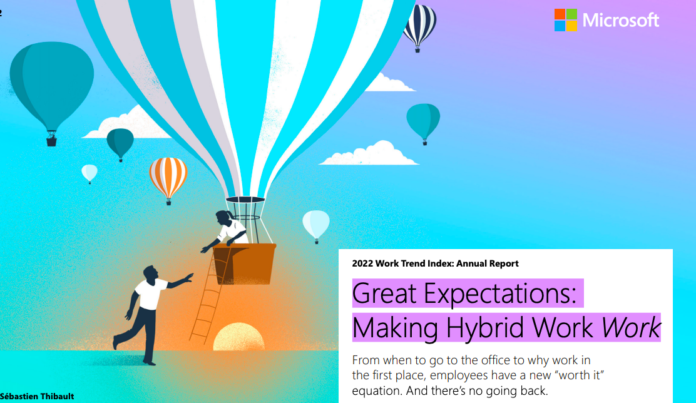Three in every five (60%) of managers in Singapore say leadership at their company is out of touch with employee expectations, while 78% say they don’t have the influence or resources to drive change for their team, according to the 2022 Work Trend Index report from Microsoft.
This second issue of the annual report outlines five locally relevant trends from an external study of 31,000 people in 31 countries — including Singapore — along with an analysis of trillions of productivity signals in Microsoft 365 and labor trends on LinkedIn.
One trend is that employees are redefining what’s “worth it,” with 52% of employees in Singapore more likely to prioritise their health and wellbeing over work than before the pandemic.
Almost a quarter (23%) employees left their jobs last year, but the Great Reshuffle isn’t over, with 63% of Gen Z and Millennials in Singapore likely to consider changing employers in the year ahead.
Second, managers feel wedged between leadership and employee expectations. While more than half (51%) of leaders in Singapore plan on bringing full-time in-person work, employees feel otherwise.
More than half (53%) of workers in Singapore are considering a switch to remote or hybrid. As a result, the differences in expectations left managers feeling like they don’t have the power to drive change in their team.
Third, leaders need to make the office worth the commute as 38% of hybrid employees in Singapore say their biggest challenge is knowing when and why to come into the office. Yet, only 30% of leaders have created team agreements to define these new norms.
Fourth, rebuilding social capital looks different in a hybrid world. Almost half (49%) of leaders in Singapore say relationship-building is the greatest challenge of having employees work hybrid or remote.
However, with workers in Singapore considering a shift to remote or hybrid in the year ahead, companies cannot rely solely on the office as they rebuild social capital.
And fifth, flexibility doesn’t have to mean “always on.” Hybrid work has opened the doors for more flexible work, but the digital overload has caused people to spend more time engaging with work.
The study’s global data showed that the workday span for average Microsoft Teams user has increased by 13% or 46 minutes.
After-hours work and weekend work have also increased 28% and 14% respectively.
“The past two years prompted many of us to review our priorities and how we navigate work, especially when flexibility and well-being become non-negotiables for our people,” said Lee Hui Li, managing director of Microsoft Singapore.
“Today, we are not the same people who went home to work in early 2020,” said Lee. “Hence, leaders must embrace these new expectations with the right tools and reciprocal policies in place, so they can set their people and their business up for long-term success, as they build a resilient, digitally inclusive economy.”
















